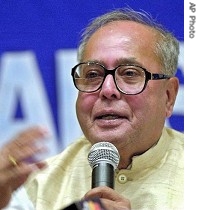2007年VOA标准英语-Indian Cabinet Approves US Nuclear Pact(在线收听)
New Delhi
25 July 2007
India's cabinet has approved an agreement expected to pave the way for an unprecedented civilian nuclear cooperation accord with the United States. As Anjana Pasricha reports, the government will now seek the approval of its political allies and opposition parties.
The Indian cabinet Wednesday approved a technical agreement that is to clear the path for the United States to sell nuclear fuel and reactors for Delhi's civilian nuclear program.
The approval comes days after Indian and U.S. officials met in Washington to negotiate outstanding issues that have held up a final agreement on the civilian nuclear accord.
Details of the pact have not been made public, but a joint statement last week said that the countries had made "substantial progress."
 |
| Pranab Mukherjee (file photo) |
"Naturally it is expected that there will be a debate and we would like to take the earliest opportunity of informing the members of parliament," he saud.
The civilian nuclear accord was agreed to in principle two years ago, but bogged down over details. Two of India's primary objections were U.S. demands that it refrain from further nuclear weapons testing and from the reprocessing of U.S.-supplied atomic fuel.
Strategic affairs analyst at the independent Center for Policy Research in New Delhi, Bharat Karnad, says the government has to satisfy critics at home who are concerned that the pact could hamper the country's strategic weapons program.
"This is the just the beginning of a very elongated process of political interaction between government and the opposition parties, its own coalition partners like the left parties, between the government and the nuclear establishment, between the government and strategic community trying to explain just what has been negotiated," he said. "There are all kinds of apprehension in the nuclear establishment as to the kind of compromises that have led to this document."
The deal is expected to help India meet soaring energy needs by reversing three decades of U.S. sanctions imposed due to nuclear tests conducted by India in 1974 and 1998.
The nuclear deal also needs approval from the U.S. Congress as well as by the International Atomic Energy Agency. It has been touted in both India and the U.S. as the cornerstone of an emerging partnership between the two countries.